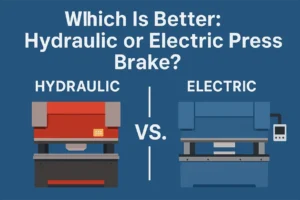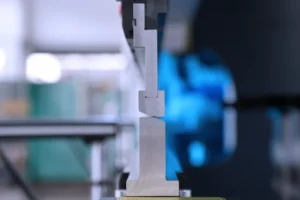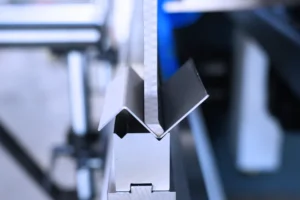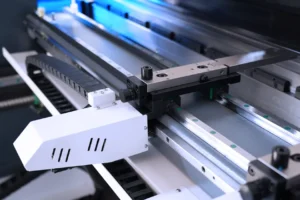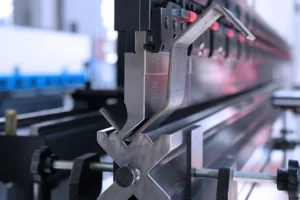Fabrication shops and manufacturing companies are always looking for new and powerful machines to help them stay ahead of the competition. Unfortunately, most of these machines are sophisticated, expensive, and require in-depth expertise to operate. However, there are a few handy and easy-to-use fabrication machines that every shop or company ought to have. One of these such machines is the Iron Worker Machine, a versatile and affordable tool that helps accomplish a myriad of processes in today’s fabrication shops.
Overview
Modern systems use hydraulic rams powered by a high-powered alternating current electric motor. High strength carbon steel blades and dies of various shapes are used to work the metal. The machine itself is made of very heavy steel to handle the enormous force that can be generated during use. Ironworkers are rated according to the force they can generate in tons; ratings usually start at 20 tons and go as high as 220 tons. Mechanical ironworkers are mostly used in productions with low temperature in winter (up to −20 °C (−4 °F)) and are considered to be faster. Another reason to choose the mechanical construction is when cutting of large profiles (up to 300 mm (12 in) and bigger) is needed. Most hydraulicals can't cut this size. The disadvantages are the higher power consumption (sometimes double for the same job), the noise and the safety concerns.
Safety
Ironworkers are built with safety in mind, but they still present hazards that must be addressed and thoroughly considered before they are purchased. Most of them have at least 4 stations that require boundaries around them to safely produce parts. They can shear flat plate, angle iron, round and square bar stock as well as punch plates, angles, I-beam and channel iron. Some have a station for notching and forming different types of materials. The area around each station should be at least 20 feet (6 m), since that is the common stock length of most materials used on ironworkers.
Due to the reduction in the amount of man hours and effort needed to cut or punch steel sections, an ironworker is often an integral part of commercial manufacturing facilities and fabrication shops. They are easily re-tooled for various operations and can be operated by one person.
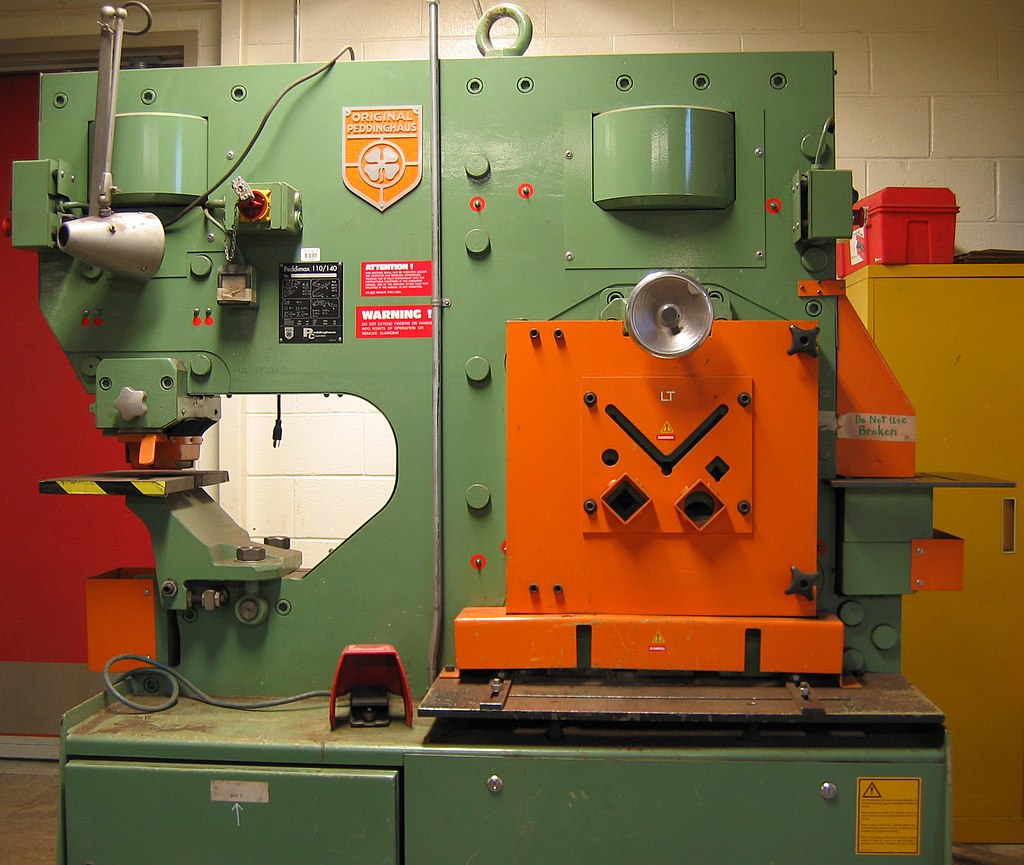
What Exactly is an Iron Worker Machine?
An ironworker is a robust, multi-functional machine that is designed to handle a myriad of jobs that are done by fabricators and manufacturers. Most of today's ironworkers come as either single or dual operator machines and can be fitted with a variety of controllers to allow for some form of automation although generally these are completely manual machines. They come in a variety of makes, models and sizes and different makes/models boast some unique specifications and capacities, these are the qualities that help you choose the ironworker equipment that is ideal for your kind of projects.
An ironworker is an essential tool in any fabrication shop or manufacturing facility because it performs various tasks without the need to retool. It helps save time, eliminate waste, increase productivity, and create smooth holes and cuts. Some manufacturers produce ironworkers that feature optional accessories that can be added to a station to perform other additional functions such as coping, notching etc.
Parts and Components of Ironworker Machines
There are five parts or stations on an ironworker machine.
- Angle Station
- Bending or cutting
- Notching Station
- Shearing Station
- Punching Station
Each machine is built with safety in mind. Therefore, the area around each station should be made so that operators can stand and work at least 20 feet from each other since that is the standard stock length of most materials used on ironworkers.
Each station is responsible for performing different tasks depending on the job. For example, they can all make U-shaped bars, punch plates, and flat shear plates on the same machine. Ironworker machines are also popular because they can be quickly retooled for various operations and operated by one person.
Popular Types of Ironworker Machines
The most popular type of ironworker machine is the hydraulic ironworker. The standard hydraulic ironworker machine comes equipped with repeatable backing tables in punching, shearing, scoring stations, and adjustable clamps on all five workstations to safely control operations.
The hydraulic ironworker machine is evolutionary in the steel fabrication industry as it can shear flat sheets, round and square bars, punch plates, angles, I-sections, and channels. The machine just needs an electrical source to operate, and it also typically requires one to two operators to oversee production.
The main difference between hydraulic and mechanical ironworker machines is that while, as the name implies, hydraulic systems use hydraulics to generate force, mechanical machines use an electric motor connected to a drive wheel. As a result, hydraulic systems are generally more resistant to wear, while mechanical systems are traditionally used for light gauge steel applications.
Basic models of the ironworker machine use leverage to operate. However, these machines need to be bolted down to a fixed object, and it requires human force to operate the machine so that it can perform its variety of functions.
What Functions Does an Iron Worker Machine Perform?
Generally, the ironworker machine can do three things, which makes them adaptable pieces of machinery. The three main functions of the ironworker are shearing, notching, and punching sheet metal, though sometimes they can also form and bend metal, too. These are useful capabilities for fabricators and manufacturers, and it is particularly useful to have these functions available in one machine. Keep reading to discover the ins and outs of each of the main functions of the ironworker.
Punching: When it comes to sheet metal, punching refers to the process of cut-outs or holes being created in the metal by the application of significant force. A variety of different shapes can be created, though geometric shapes are standard.
Shearing: Shearing is a process where the sheet metal is sliced with a blade attached to the ironworker. Some of the advantages of shearing are that the metal can be cut at room temperature, not requiring heating beforehand, and the fact that shearing creates less waste than other metal cutting processes.
Notching: Notching is a process that is related to shearing, and essentially involves using the ironworker to cut away material from the outer edges of the sheet metal. The process allows complex shapes to be cut from metal with precision.
Advantages of Using an Ironworker Machine?
Multi-functional: One of the great advantages of ironworkers is that they perform multiple functions in one machine – this means that they are adaptable and flexible machines that can promote productivity as they are capable of carrying out more than one task.
Efficiency: These machines are energy efficient, cost-efficient, and time efficient, due to the fact that they don’t take very many people to operate, they perform multiple functions, and they are not expensive to run. This efficiency means they are valuable machines for your workplace if you’re in fabrication or manufacturing in particular.
Precision and Accuracy: An ironworker is a machine that has the capability to smoothly cut metal, and to precisely make holes and shapes in metal, too. This precision and accuracy mean that time and labour is saved as there isn’t a need for extra manual or mechanical cutting after the fact.
General Capabilities of An Iron Worker Machine
An ironworker machine can come in many different sizes, with the specifications of each one varying accordingly. For example, the weight of an ironworker machine can vary from 1,500kg to over 12,000kg, with the corresponding cutting force ranging from 600kN to 2500kN respectively.
Ironworkers can cut plates from 16mm thick up to 40mm thick, punch through metal up to 35mm thick and cut channel up to 300mm.
Depending on the size of the actual machine, you can feed different lengths of the metal products into an ironworker – it is possible to shear flat plates up to 750mm in length. This makes these machines incredibly versatile and a useful addition to any metal workshop.
How to Determine the Capability of an Ironworker Machine?
Selecting the right Ironworker Machine requires a deep dive into its capabilities. Inadequate or excessive capacity can lead to inefficient operations or even risk equipment damage. So, what factors should you consider when evaluating an Ironworker Machine's capabilities? Let's delve into it.
Material Thickness and Type
The thickness and type of material you plan to work with directly influence the capability needed. Check the machine’s specifications to see if it can handle the material in question. For instance, a machine capable of shearing half-inch thick steel may not be suitable for three-quarter-inch thick aluminum.
Workload and Volume
Are you looking to use the machine for high-volume production or sporadic tasks? The machine's tonnage and cycle times will give you an idea of how much it can handle. Pay attention to these figures to ensure the machine meets your workload requirements.
Task Versatility
If you need the machine for a variety of tasks—punching, shearing, notching, and bending—make sure it comes with the necessary tool stations and attachments. Your choice might differ based on whether you need a machine for specialized tasks or general-purpose work.
Ease of Operation
An easy-to-use interface or control panel can make a significant difference in operation speed and error rates. Especially with CNC Ironworkers, make sure the machine offers an intuitive user interface.
Safety Features
Don’t overlook safety when evaluating a machine’s capabilities. Ensure it comes with adequate safety features like emergency stop buttons, safety guards, and sensor systems.
Top Iron Worker Machine Manufacturers
GEKA
Since 1919, GEKA has been manufacturing ironworkers for processing angles, plates, and steel profiles for metal constructions, metal workshops, telecommunication, and electricity towers.
They design, manufacture, and supply their hydraulic ironworkers with GEKA quality standards.
Pioneers developed ironworkers for steel working. They keep researching, developing, and innovating so that they can fulfill clients and market requirements.
Years of hard-working with their customers. Years studying and solving their needs: GEKA has a deep knowledge of the market bringing unique solutions.
They machine all their parts and tools at GEKA. They machine and harden all their parts so that their quality standards are much higher than others offered in the market.
Their technical department can design and provide almost any accessory for your GEKA machine to face all the jobs.
EDWARDS
EDWARDS Manufacturing was started by Charles Douglas EDWARDS in 1875.
EDWARDS Manufacturing is primarily driven by its production of Ironworkers. The JAWS line of EDWARDS Ironworkers has recently been expanded with the addition of the new EDWARDS ELITE line. EDWARDS ELITE Ironworkers boast high-quality design and a host of integrated features.
Both lines of Ironworkers are bolstered by their extensive line of Tooling Accessories, giving the user the ability to tailor their Ironworker to their specific needs. The Ironworker line is further complemented by a line of innovative Hydraulic Accessory Tools, powered by an EDWARDS Ironworker or the EDWARDS Porta Power, a portable hydraulic power unit. These tools expand the abilities of your shop quickly and economically.
EDWARDS Manufacturing designs and manufactures more than Ironworkers. The EDWARDS Strut Pro is an innovative hydraulic tool for cutting commonly branded strut products. The Tru-Chek Rain Gauge is an extremely accurate, heavy-duty rain gauge ideal for a wide range of users.
DURMA
The DURMA brand has a strong history of providing solutions for customers’ day-to-day operations in the past 60-plus years. With more than 2,000 employees, managing business in 156 countries, the DURMA machines are used in all industries including technology-sensitive companies such as space shuttles, defense, airplane manufacturers, and it doesn’t stop there.
The machines are energy efficient, have industry 4.0 technology, have great endurance, are very powerful, and communicate with each other globally. DURMA even manufactures trains.
DURMA wanted to be closer to its existing customers while expanding its presence in the manufacturing market so it opened its doors in Michigan, as DURMA North America, in January 18 century. DURMA North America is the only official DURMA factory branch in America.
DURMA North America is a 90,000 square feet facility with a 40,000 square feet showroom, having a training area for metal fabricating customers, a complete spare parts department, and service technicians readily available to service machines. Now, their customers in the United States will be supported by DURMA’s corporate resources from a local vantage point.
Krrass
Krrass is a modern enterprise that manufactures various kinds of NC and CNC press brake, shearing machines, hydraulic press, power press, Ironworker, laser cutting machine, and other related machines. They always adhere to the business principle of “ making better machines, providing first-class service “, so their products have been trusted widely in many industries.
Under the guidance of the “ professional, satisfactory, high performance-to-price ratio ” policy, they always try to provide a complete and thoughtful proposal to customers by their specialty and experience. What is more, they have a world-class R&D team to ensure that they can design professional and innovative machines. They can also provide overseas installation, training, maintenance, and commissioning services for each client to confirm that they can operate Krrass machines properly and enjoy high performance and best service during operation.
They have a huge global customer source market, a good basic service network, and efficient service capabilities for modern sales. They devote themselves to different forms of customer service, strengthen customer care through relevant thematic services, continuously form a good reputation, and quickly improve brand reputation and customer satisfaction.
ERMAKSAN
In a journey that left behind half a century, ERMAKSAN is taking firm steps to the future by continuing to develop “innovative technologies”.
ERMAKSAN continues to operate with the 21st century’s innovative perspective, with the goal of becoming one of the world’s leading producers in the fields of technology and R&D.
ERMAKSAN is a leading industrial organization that shapes the sheet metal processing machines sector with its strong R&D, that produces high-quality machines with high technology with more than its 800 qualified staff in its modern production facilities extending to an area of 96.000 m2.
In a 10.000 m2 field, it continues to carry out future-oriented R&D works such as Fiber laser technologies, new machine models; Industry 4.0 applications, and 3D printer (additive manufacturing) machines. The machines produced by ERMAKSAN now operate in 110 countries.
Continuously following the new trends and customer expectations, and designing and producing machines with advanced technology, high added value, that are environmentally friendly and energy-saving, ERMAKSAN takes firm steps forward on the way of sustainable growth by using resources effectively and efficiently.
NARGESA
PRADA NARGESA S.L. is a family company founded in 1970, located near Barcelone, Spain with more than 40 years experience in the branch of manufacturing industrial machinery: Profile formers, Hydraulic Punching machines, Forging Machines; propane furnaces, Hydraulic Press brakes, Shears, Broaching machines, Weld Positioners, etc.
All their range of machines and accessories is completely manufactured at NARGESA. They have 10.000m2 facilities and a regular stock of 400 machines. They count on more than 10.500 customers and more than 20.800 machines sold all over the world.
Nowadays they are exporting to Europe: Portugal, Italy, France, England, Ireland, Norway, Germany, Poland, Russia, Romania, …America and Latinamerica: USA, Mexico, Costa Rica, El Salvador, Nicaragua, Panama, Colombia, Peru, Chile, Paraguay, Brazil, Ecuador… In Africa: Algeria, Morocco, Tunisia, Gabon, South Africa, Guinea…In Asia and the Middle East: Irán, Bahrain, Brunei, United Arab Emirates…
NARGESA is a symbol of Quality, Reliability, Guaranty, and Innovation:
All their products are made with electrical and hydraulic components of the best European trademarks.
Production is made under strict quality regulations. All machines are meticulously tested before delivery.
All NARGESA machines are according to the current safety rules and are provided with their corresponding certificate.
3 years Guaranty, Strong and reliable machines.
NARGESA has got its own R+D which guarantees a steady evolution and improvement. Every year new products are launched into the market as a result of their feedback from their customers’ experience.
How to Choose the Right Ironworker Manufacturer
Selecting the right Ironworker Manufacturer is not just about the price tag or the machine itself. There are various considerations to keep in mind that go beyond the immediate concerns. Let's explore what makes a manufacturer the right fit for your needs.
Quality and Reliability
First and foremost, assess the quality and reliability of the machines the manufacturer produces. A durable, high-performance machine will save you money and headaches in the long run. Reviews, testimonials, and referrals can be valuable resources for gauging quality.
Technical Support
Does the manufacturer offer robust after-sales support? Reliable technical support can make a world of difference when you run into issues or require replacement parts. Be sure to inquire about the extent of support services available.
Warranty and Service Agreements
Consider the warranty and service agreements carefully. A manufacturer that stands behind their product will typically offer a comprehensive warranty. Also, look for any service agreements that might be available for routine maintenance.
Industry Experience
How long has the manufacturer been in the industry? Experience often correlates with expertise, so a manufacturer with a proven track record is generally a safer bet. Their history in the field can give you insight into their credibility and quality of work.
Customization Options
Do they offer customization? Depending on your specific needs, the ability to customize your machine might be crucial. Check whether the manufacturer can accommodate custom requests, and at what cost.
In summary, choosing the right Ironworker Manufacturer involves a mix of factors such as quality, support, and experience. Your choice will significantly impact the effectiveness and longevity of your Ironworker Machine, so choose wisely.
Conclusion
In a word, an Iron worker machine is a class of machine that can shear, notch, and punch holes in steel plate and profiles. The name is now used to refer to the whole class of machines (made by at least a dozen brands, including Edwards). If there ever was a brand name, it has now become a genericized trademark. Ironworkers generate force using mechanical advantage or hydraulic systems. When buying an iron worker machine, focus on the machine’s tonnage, functionality, durability, and support options. Carefully evaluate what tasks you'll perform, the materials you'll use, and your available budget. Whether you choose a new or used machine, investing in a reliable and capable ironworker will pay off in productivity and performance.
